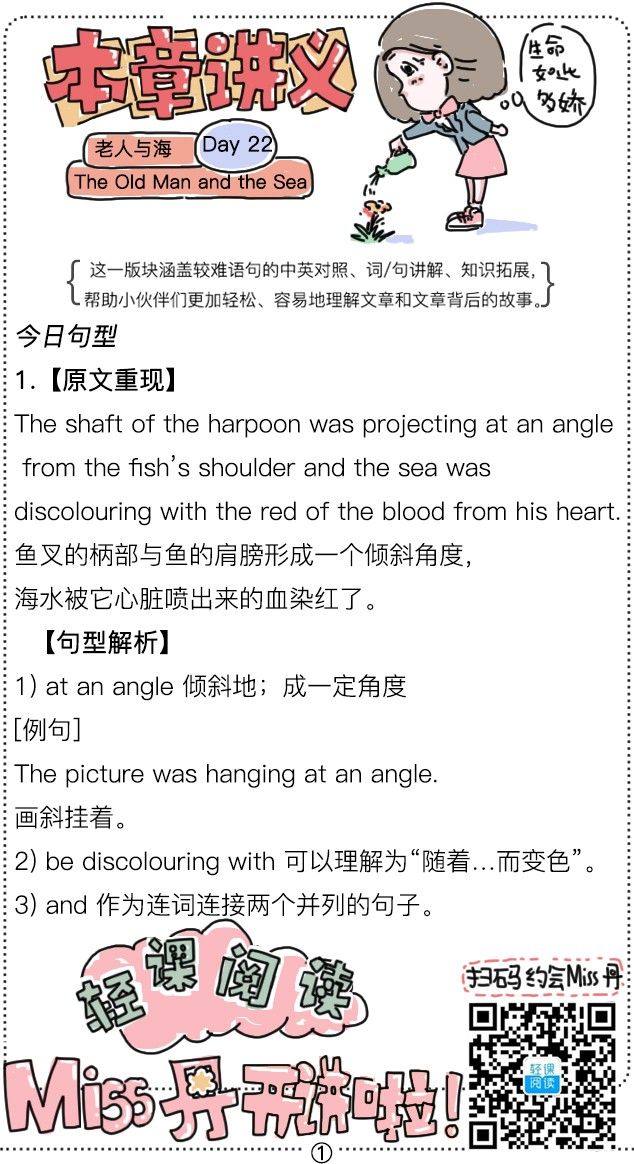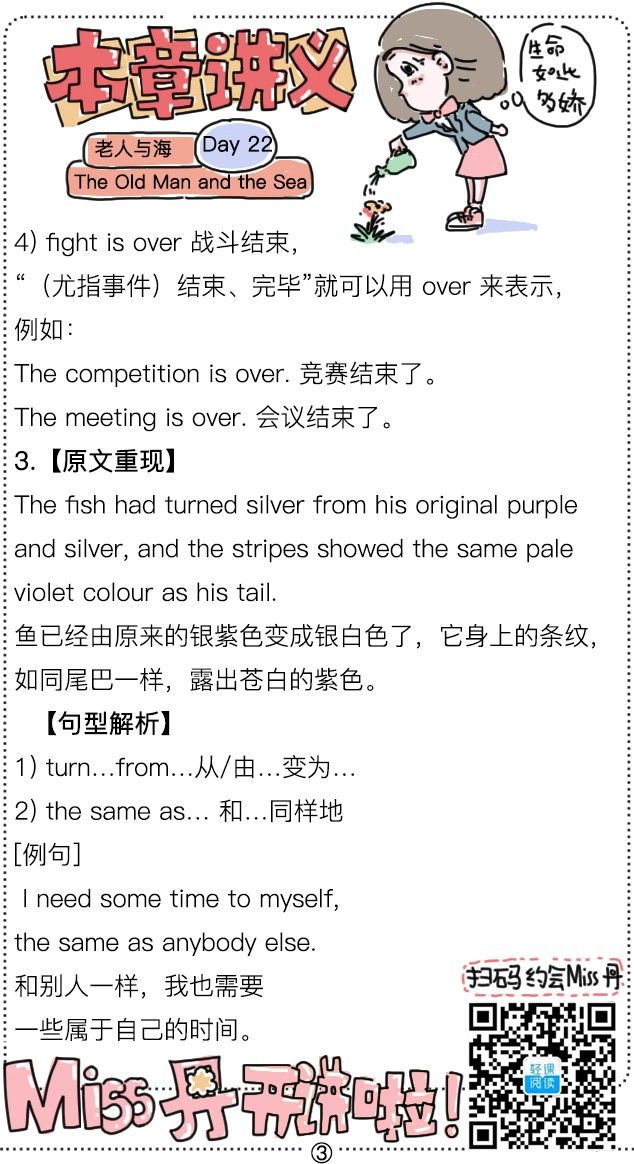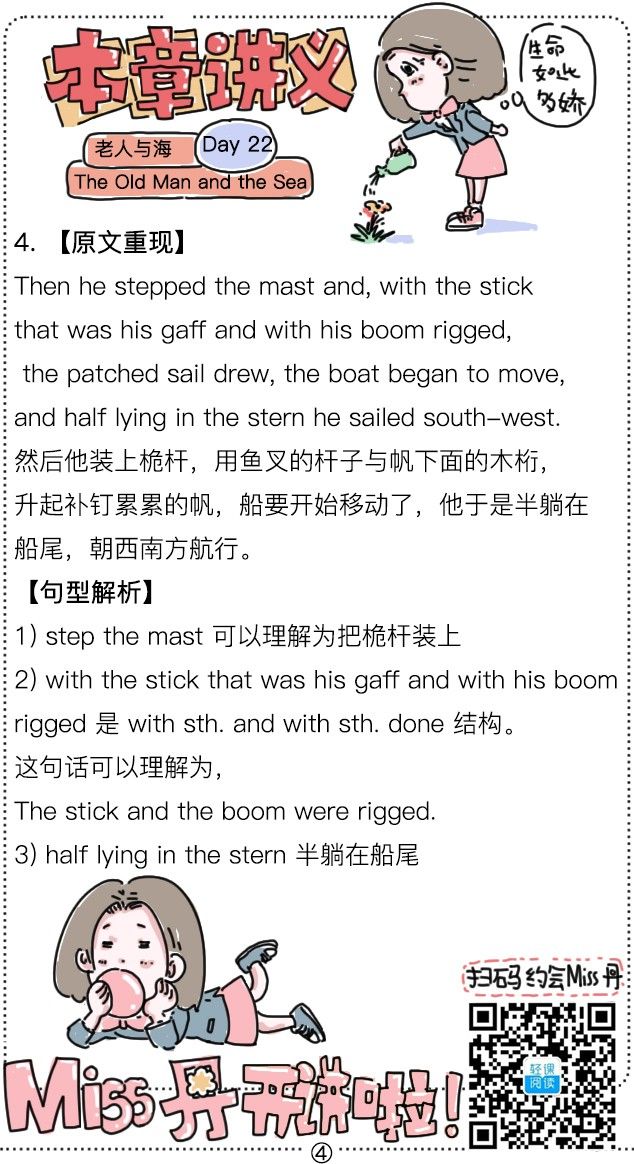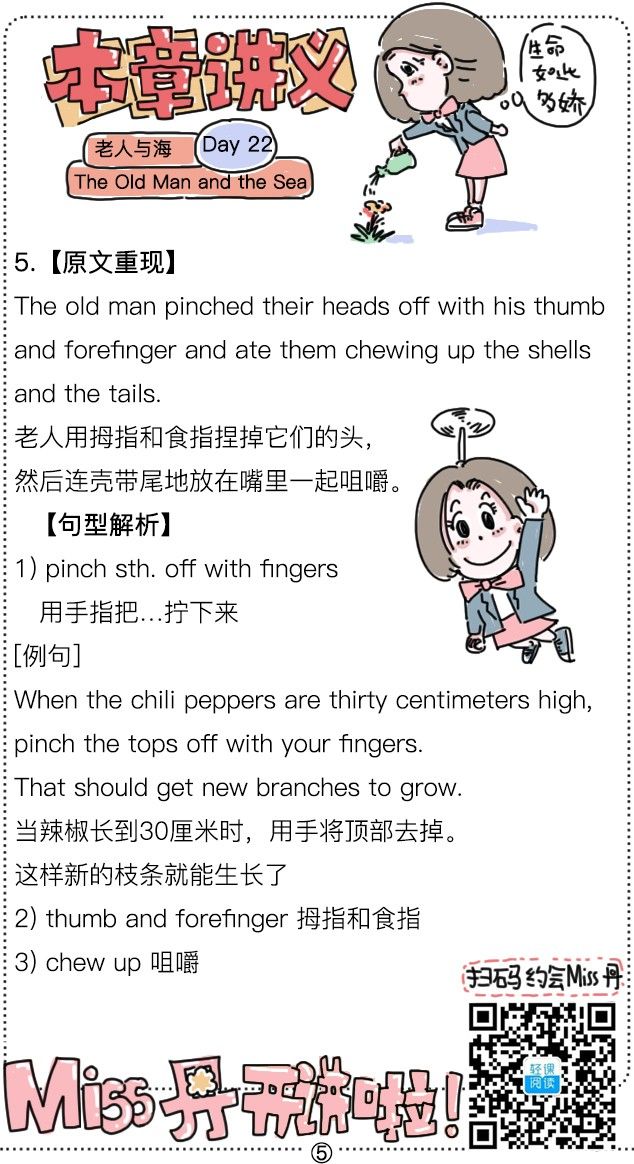The old man felt faint and sick and he could not see well. But he cleared the harpoon line and let it run slowly through his raw hands and, when he could see, he saw the fish was on his back with his silver belly up.
The shaft of the harpoon was projecting at an angle from the fish’s shoulder and the sea was discolouring with the red of the blood from his heart. First it was dark as a shoal in the blue water that was more than a mile deep. Then it spread like a cloud. The fish was silvery and still and floated with the waves.
The old man looked carefully in the glimpse of vision that he had. Then he took two turns of the harpoon line around the bitt in the bow and laid his head on his hands.
“Keep my head clear,” he said against the wood of the bow. “I am a tired old man. But I have killed this fish which is my brother and now I must do the slave work.”
Now I must prepare the nooses and the rope to lash him alongside, he thought. Even if we were two and swamped her to load him and bailed her out, this skiff would never hold him. I must prepare everything, then bring him in and lash him well and step the mast and set sail for home.
He started to pull the fish in to have him alongside so that he could pass a line through his gills and out his mouth and make his head fast alongside the bow. I want to see him, he thought, and to touch and to feel him. He is my fortune, he thought. But that is not why I wish to feel him.
I think I felt his heart, he thought. When I pushed on the harpoon shaft the second time. Bring him in now and make him fast and get the noose around his tail and another around his middle to bind him to the skiff.
“Get to work, old man,” he said. He took a very small drink of the water. “There is very much slave work to be done now that the fight is over.”
He looked up at the sky and then out to his fish. He looked at the sun carefully. It is not much more than noon, he thought. And the trade wind is rising. The lines all mean nothing now. The boy and I will splice them when we are home.
“Come on, fish,” he said. But the fish did not come.
Instead he lay there wallowing now in the seas and the old man pulled the skiff upon to him.
When he was even with him and had the fish’s head against the bow he could not believe his size. But he untied the harpoon rope from the bitt, passed it through the fish’s gills and out his jaws, made a turn around his sword then passed the rope through the other gill, made another turn around the bill and knotted the double rope and made it fast to the bitt in the bow. He cut the rope then and went astern to noose the tail.
The fish had turned silver from his original purple and silver, and the stripes showed the same pale violet colour as his tail. They were wider than a man’s hand with his fingers spread and the fish’s eye looked as detached as the mirrors in a periscope or as a saint in a procession.
“It was the only way to kill him,” the old man said. He was feeling better since the water and he knew he would not go away and his head was clear. He’s over fifteen hundred pounds the way he is, he thought. Maybe much more. If he dresses out two-thirds of that at thirty cents a pound?
“I need a pencil for that,” he said. “My head is not that clear. But I think the great DiMaggio would be proud of me today. I had no bone spurs. But the hands and the back hurt truly.” I wonder what a bone spur is, he thought. Maybe we have them without knowing of it.
He made the fish fast to bow and stern and to the middle thwart. He was so big it was like lashing a much bigger skiff alongside. He cut a piece of line and tied the fish’s lower jaw against his bill so his mouth would not open and they would sail as cleanly as possible.
Then he stepped the mast and, with the stick that was his gaff and with his boom rigged, the patched sail drew, the boat began to move, and half lying in the stern he sailed south-west.
He did not need a compass to tell him where southwest was. He only needed the feel of the trade wind and the drawing of the sail. I better put a small line out with a spoon on it and try and get something to eat and drink for the moisture.
But he could not find a spoon and his sardines were rotten. So he hooked a patch of yellow Gulf weed with the gaff as they passed and shook it so that the small shrimps that were in it fell onto the planking of the skiff.
There were more than a dozen of them and they jumped and kicked like sand fleas. The old man pinched their heads off with his thumb and forefinger and ate them chewing up the shells and the tails. They were very tiny but he knew they were nourishing and they tasted good.
The old man still had two drinks of water in the bottle and he used half of one after he had eaten the shrimps. The skiff was sailing well considering the handicaps and he steered with the tiller under his arm. He could see the fish and he had only to look at his hands and feel his back against the stern to know that this had truly happened and was not a dream.
At one time when he was feeling so badly toward the end, he had thought perhaps it was a dream. Then when he had seen the fish come out of the water and hang motionless in the sky before he fell, he was sure there was some great strangeness and he could not believe it.
Then he could not see well, although now he saw as well as ever.




